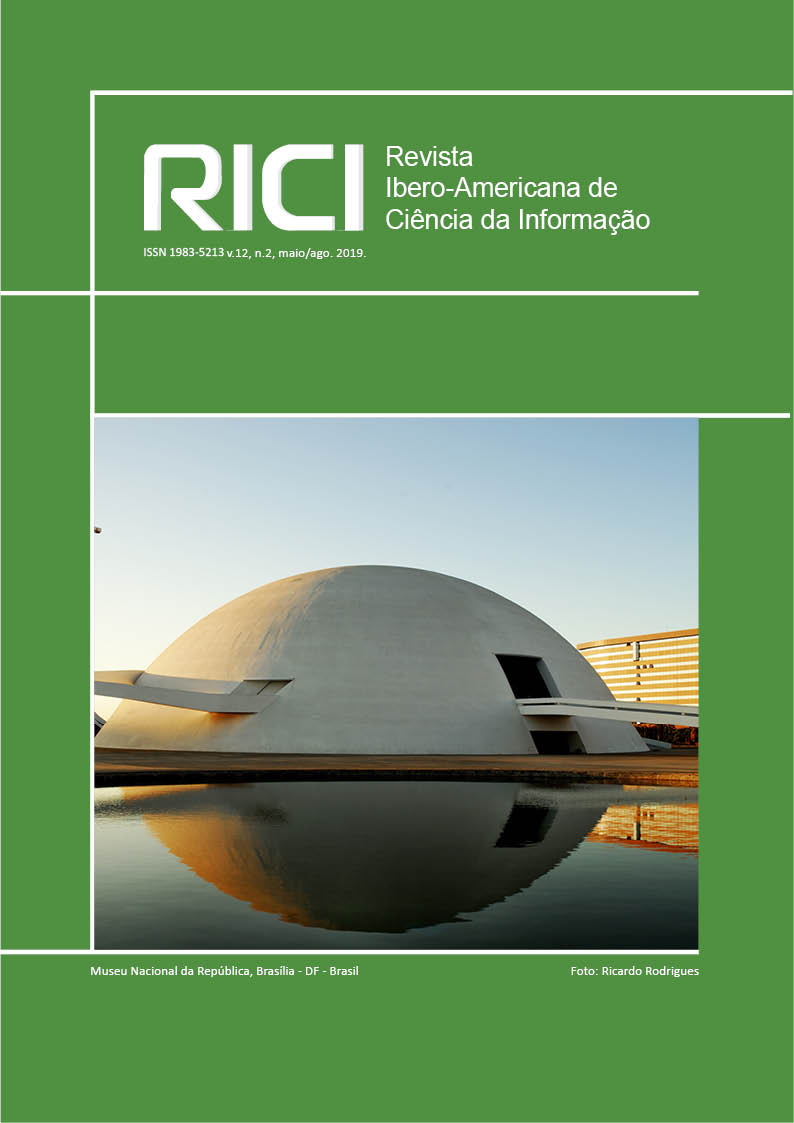Social role and function of public libraries: the librarian point of view
DOI:
https://doi.org/10.26512/rici.v12.n2.2019.20642Keywords:
public libraries. qualitative research. social function. social library. User studies. vulnerable users.Abstract
Public libraries already assume, as one of their priorities, to facilitate access to information and digital literacy, understood as a requirement for the basic human right to information. Because of it, libraries facilitate information and digital literacy services devoted to improving users’ competences for a critical, reflexive and intentional use of information. This function has been recently valued as a compensatory factor of the digital divide of vulnerable user, and a way to reduce their degree of social exclusion. The aim of this research is to analyze the potential and limitations that public libraries present when design and apply information and digital literacy services for their users. The methodology is based on qualitative techniques as the interview and the discussion groups. Interviews to librarians were carried out to ten considered expert ones using a questionnaire including ten questions linked with the social function and about the role that public libraries should play for social inclusion of citizens. Points of view of public librarians of the Region of Murcia was obtained by means of three groups of discussion selected according with population size of cities where are located their libraries following the same script, structured according with topics about social inclusion services as their human and material resources, competences needed by librarians, typology of users, and so on. The discourses obtained confirm that librarians have different conceptions about the social function of the library and, therefore, manifest a different degree of commitment to this role. This commitment is conditioned by aspects such as resources, the type of users or the training of the librarian and, above all, the attitudes of librarians as well as local political leaders are very relevant. To minimize these restrictions, a set of leadership and collaboration strategies must be developed with other agents, external and internal, which are described in the document.
Downloads
References
AYUNTAMIENTO DE MADRID. La biblioteca de San Fermín, un proyecto fruto de la colaboración entre vecinos y el Ayuntamiento. Ayuntamiento de Madrid. 2016. Retrieved: October 16, 2018. From <https://bit.ly/2PQflBU>
CARIDAD-SEBASTIÁN, M.; GARCÃA-LÓPEZ, F.; MARTÃNEZ-CARDAMA, S.; MORALES-GARCÃA, A. M. Bibliotecas y empoderamiento: servicios innovadores en un entorno de crisis. Revista Española de Documentación Científica, v. 41, n. 2, p. 1-14, 2018 <https://doi.org/10.3989/redc.2018.2.1486>
CASTILLO-FERNÁNDEZ, J. Biblioteca punto de empleo. In: CASTILLO-FERNÁNDEZ, J.; GÓMEZ-HERNÁNDEZ, J. A.; QUÃLEZ-SIMÓN, P. (Eds.). La biblioteca pública frente a la recesión, acción social y educativa. Murcia: Tres Fronteras. 2010 . p. 173”“188.
CÓDIGO DE ÉTICA PARA BIBLIOTECARIOS Y PROFESIONALES DE LA INFORMACIÓN DE ESPAÑA. Madrid: Federación Española de Sociedades de Archivística, Biblioteconomía, Documentación y Museística, 2013. <http://www.fesabid.org/sites/default/files/repositorio/codigo-etico-esp.pdf>
CONSEJO DE COOPERACIÓN BIBLIOTECARIA. GRUPO DE TRABAJO FUNCION SOCIAL DE LA BIBLIOTECA. Decálogo Biblioteca social. España, 2017. Retrieved from: <http://www.ccbiblio.es/wp-content/uploads/Decálogo-Biblioteca-social.pdf>
D’ALÒS-MONER, A.; BAILAC, A.; HERNÁNDEZ-SÁNCHEZ, H. Dimensión social de las bibliotecas públicas. Anuario ThinkEPI, v. 9, p. 66”“71. 2015. <https://doi.org/10.3145/thinkepi.2015.12>
DOMÃNGUEZ-SANJURJO, R. El cambio invisible. Biblioteca y sociedad. Boletín de la Asociación Andaluza de Bibliotecarios, n. 113, p. 21”“28, 2017. Retrieved from: <https://www.aab.es/publicaciones/boletín-aab/boletín-113/>
ELMBORG, J. K. Libraries as the Spaces Between Us: Recognizing and Valuing the Third Space. Reference & User Services Quarterly, v. 50, n. 4, p. 338-350, 2011. <https://doi.org/10.2307/20865425>
FUNDACIÓN BIBLIOTECA SOCIAL. Mapa de proyectos. Convocatoria 2017. 2018. <https://fundacionbibliotecasocial.org/es/categories-map/convocatoria-2017-es/>
GÓMEZ-HERNÁNDEZ, J.-A.; HERNÁNDEZ-PEDREÑO, M.; ROMERO-SÁNCHEZ, E. Social and digital empowerment of vulnerable library users of the Murcia Regional Library, Spain. El Profesional de La Información, v. 26, n. 1, p. 20-33, 2017. <https://recyt.fecyt.es/index.php/EPI/article/view/epi.2017.ene.03/33295>
GUERREIRO, J. Espacio compartido: Modelo de relación biblioteca - comunidad basado en la participación ciudadana y la teoría de los stakeholders. 2016. <http://hdl.handle.net/10366/133019>
IFLA. Lyon Declaration on access to information and development. 2014.
IFLA. Access and oportunities for all. How libraries contribute to the United Nations 2030 Agenda. The Hague: IFLA. 2016 Retrieved from: <https://www.ifla.org/files/assets/hq/topics/libraries-development/documents/access-and-opportunity-for-all.pdf>
IFLA. Guidelines for Library Services to People Experiencing Homelessness. The Hague, Netherland. 2017. Retrieved from: <https://www.ifla.org/files/assets/lsn/publications/ifla-guidelines-for-library-services-to-people-experiencing-homelessness.pdf>
IFLA. Global Vision: Top 10 Highlights and Opportunities. 2018. <https://www.ifla.org/files/assets/GVMultimedia/publications/gv-report-summary_2.pdf>
MERLO-VEGA, J.-A.; CHU, C.-M. Out of Necessity Comes Unbridled Imagination for Survival: Contributive Justice in Spanish Libraries during Economic Crisis. Library Trends, v. 64, n. 2, p. 299-328, 2015. <https://doi.org/10.1353/lib.2015.0051>
MERLO-VEGA, J.-A., GÓMEZ-HERNÁNDEZ, J.-A.; HERNÁNDEZ-SÁNCHEZ, H. Estudio FESABID sobre los profesionales de la información: prospectiva de una profesión en constante evolución. Madrid: Federación Española de Sociedades de Archivística, Biblioteconomía, Documentación y Museística, FESABID.2011. <https://doi.org/10.13140/RG.2.1.2489.6080>
PÉREZ-SALMERÓN, G. Acceptance Speech. In: IFLA WORLD LIBRARY AND INFORMATION CONGRESS. Libraries. Solidarity. Society. Wroclaw (Poland)., 2017. Retrieved from: <https://www.ifla.org/node/11791>
TOGORES, R. El valor de las bibliotecas públicas en la sociedad: El caso de la red de bibliotecas municipales. Barcelona: Diputació de Barcelona, 2014. Retrieved from: <http://www.diba.cat/documents/16060163/22275360/valor_social_bibliotequesXBM_cast.pdf/02926665-2d7e-4044-88c2-9634abed0c89>
Downloads
Published
How to Cite
Issue
Section
License
Copyright (c) 2019 Eduardo Romero-Sánchez, José-Antonio Gómez-Hernández, Manuel Hernández-Pedreño

This work is licensed under a Creative Commons Attribution 4.0 International License.
Copyright Notice
Authors who publish in this journal agree to the following terms:
- Authors retain copyright and grant the journal right of first publication with the work simultaneously licensed under the Creative Commons Attribution License 4.0, allowing the sharing of work and recognition of the work of authorship and initial publication in this journal.
- Authors are able to take on additional contracts separately, non-exclusive distribution of the version of the paper published in this journal (ex.: distribute to an institutional repository or publish as a book), with an acknowledgment of its initial publication in this journal.
- Authors are permitted and encouraged to distribute their work online (eg.: in institutional repositories or on their website) at any point before or during the editorial process, as it can lead to productive exchanges, as well as increase the impact and citation the published work.
















